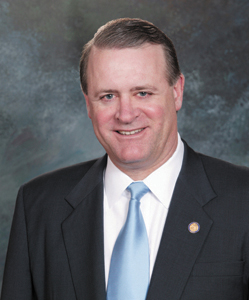STRAIGHT FROM THE SENATE
 IT’S HALFTIME!
IT’S HALFTIME!
SENATE REPUBLICANS GO THE DISTANCE ON TAX CAPS, ETHICS REFORMS, REDISTRICTING DURING 1ST HALF OF SESSION
STATEHOUSE – It’s halftime for the Indiana General Assembly’s 2010 legislative session – scheduled to wrap up by March 14. Although it’s considered a short session, Senate Republicans have already gone the distance on major issues during what most consider a super first half.
Jobs, property tax caps, ethics reforms and redistricting guidelines took early leads among the 420 Senate bills introduced. Senators showed considerable teamwork, hearing 161 bills in committee and passing 135 of them in the full Senate. These bills will now be considered by the House of Representatives.
Jobs & the Economy
As Indiana emerges from the national recession, Hoosier jobs will continue to be a top priority for lawmakers. On just the fourth day of session, Senate Republicans passed a bill preventing new unemployment insurance premiums from going into effect in 2010 – saving Hoosier businesses nearly $300 million. By avoiding premium increases, lawmakers hope employers will be in a stronger position to retain or add employees in a tough economic environment.
Lawmakers also passed Senate Bill 237 to help ensure Indiana is a leader and not a follower as states begin to recover from the national recession. The bill calls for an immediate, bipartisan review of the best economic practices used by other states in attracting, retaining and expanding business investment and job creation. Indiana’s actions to date have allowed it to weather the economic storm better than most states and the creation of this first-ever intensive study will help the state continue to be a leader as the economy gets back on track.
Property Tax Caps
In record time, Senate Republicans took historic action on behalf of taxpayers by passing a constitutional amendment to cap property tax rates in Indiana. By passing the amendment, senators guaranteed the people of Indiana will have the opportunity to vote this November on permanently capping property tax rates. If voters approve the amendment, Indiana would become the first state to create permanent tax caps for all categories of property owners – capping rates at 1 percent of assessed value for owner-occupied homes, 2 percent for other residential and agricultural properties and 3 percent for businesses.
Ethics Reforms
Senators also passed a comprehensive ethics reform bill aimed at improving transparency in government and providing the public greater accountability over state-elected officials. Senate Bill 114 would create a one-year cooling off period before a retired legislator could become a lobbyist, establish uniform and stricter lobbyist reporting requirements, end lobbyist-funded out-of-state travel by lawmakers, increase transparency by putting lobbying reports online and limit the use of taxpayer dollars for public service ads featuring elected officials. SB 114 represents the most comprehensive ethics reform package in years.
Redistricting Guidelines
There was strong bipartisan support for the Senate’s passage of sweeping redistricting reforms that established objective guidelines for drawing legislative and congressional districts and required an in-depth review of best practices used by other states in their redistricting efforts. Passed as two bills (Senate Bills 80 and 136), the measures will provide better guidelines for lawmakers to utilize when crafting new legislative districts next year and allow for an open and informed discussion on improving Indiana’s process for future rounds of redistricting.
Education
Senate Republicans placed a priority on student success in the first half of the session, passing legislation aimed at ensuring our school-aged children are able to read at a proficient level by the third grade. Senate Bill 258 empowers the State Board of Education to devise and implement a plan to ensure third grade students are reading at third grade level before being promoted. Without this directive, the board had no authority to prevent social promotion or to require schools to retain students who aren’t prepared to move to the next grade level. SB 258 has the support of State Superintendant of Public Instruction Dr. Tony Bennett.
Crime
Senate took action in the first half of the 2010 session to address a variety of criminal issues. Senate Bill 71, passed by a bipartisan vote of 50-0, would stiffen penalties against drunken drivers by amending Indiana’s law to make the killing of a fetus as a result of driving while intoxicated an involuntary manslaughter. Senate Bill 224 addresses the emerging issue of “sexting” – the act of sending semi-nude and nude photos of teens by cell phone. Currently, Indiana has no laws that cover this alarming trend except to charge teens with felonies. SB 224 would establish sexting as a delinquent act and authorize a juvenile court to require a violator of this new act to participate in an educational program or outpatient counseling. Creating a new class of punishment for sexting allows law enforcement to hold teens accountable and teach them about the seriousness of this disturbing behavior without giving them felony records that will follow them for life.
Local Government Reform
Senators again took the lead this year in the effort to streamline local government, passing legislation to reduce layers of government by eliminating township boards and moving township budgeting authority to the county level. This Senate legislation also eliminates nepotism by prohibiting township trustees from hiring family members and provides more accountability and accessibility to the public by requiring township offices to list their addresses, phone numbers and regular office hours in at least one local telephone directory.
Cost-cutting
In the face of shrinking state tax revenues caused by the national recession, Senate Republicans understand the importance of cutting costs and streamlining operations. Senate leaders began the session by calling for a moratorium on bills that increase spending, while encouraging members to find ways to save the state money and protect Hoosier taxpayers. Senate Bill 298, supported by Gov. Mitch Daniels, would save the state an estimated $70 million annually by merging the management of the Public Employee Retirement Fund (PERF) and the Teachers Retirement Fund (TRF). Benefits paid by those retirement programs would remain unchanged.
Sen. David Long (R-Fort Wayne) is President Pro Tem of the Indiana Senate. He serves District 16, which includes portions of Fort Wayne.
- THANK YOU INDIANA, IT HAS BEEN AN HONOR – Straight From The Senate - November 9, 2018
- CYBERSECURITY AWARENESS MONTH – Straight From The Senate - October 26, 2018
- INDIANA’S ECONOMY IS THRIVING – Straight From The Senate - October 12, 2018


